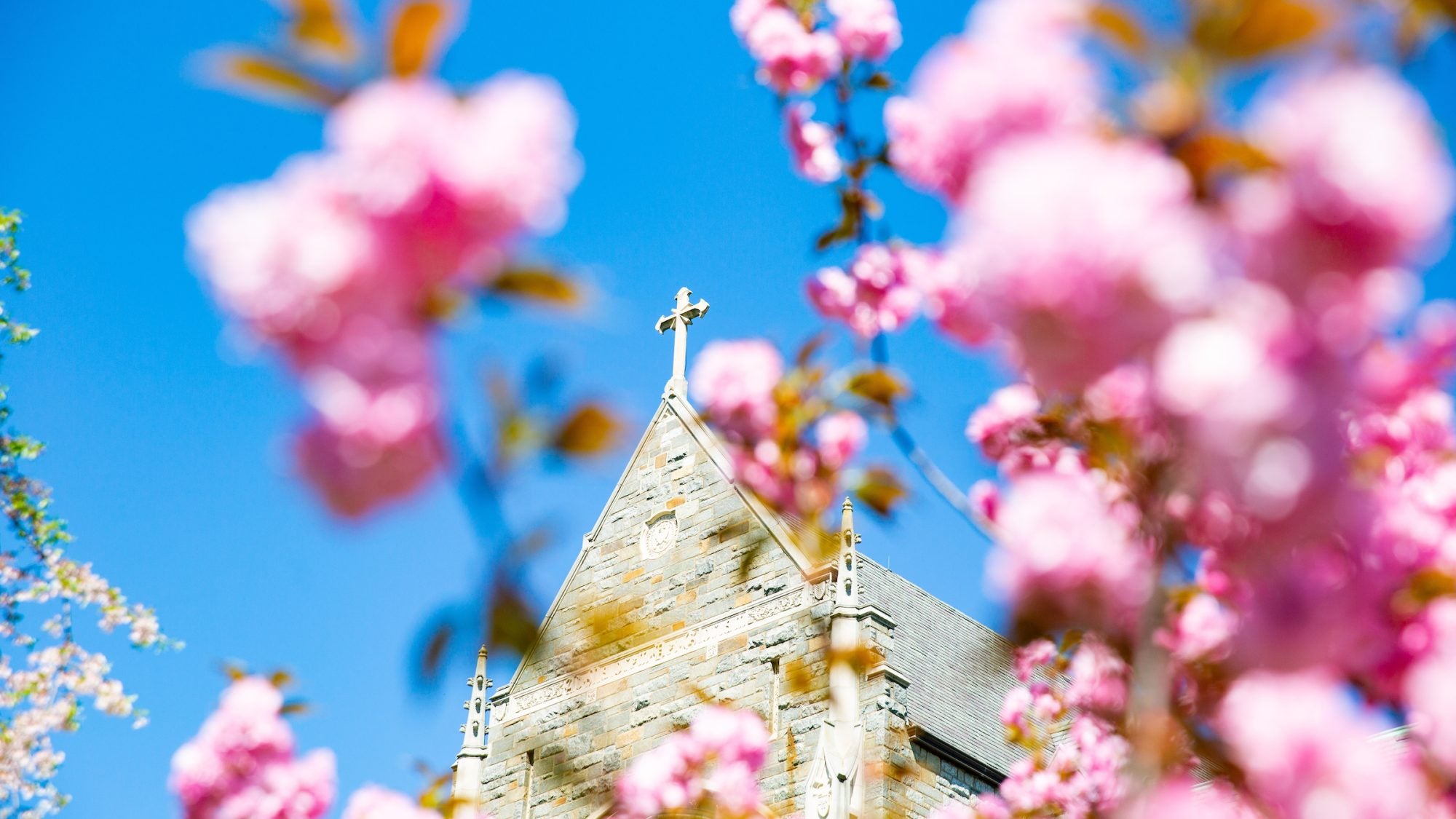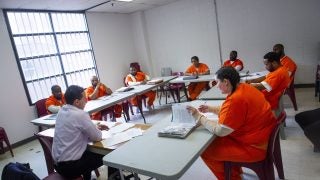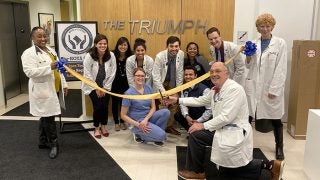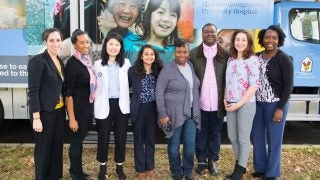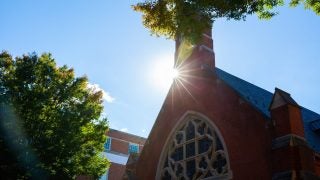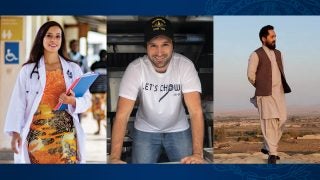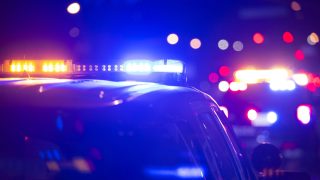A Rabbi’s Take on Faith and Identity
Julia Watts Belser grew up with a deep spiritual life — but her identity as a queer, disabled woman meant she often felt profoundly out of sync with the ways most people talked about religion.
“I came of age in a time where it felt ubiquitous to hear religious voices on the news, in politics, being actively hostile to queer lives and to queer love,” says Belser. “And that shaped me, that shaped me indelibly.”
Despite this tension — or perhaps, because of it — Belser is now a rabbi, a scholar of rabbinic Jewish culture, and an associate professor in the Department of Theology and Religious Studies. She complements her studies of ancient Jewish religious texts with works by feminist, queer and disabled authors — finding inspiration and divinity in these modern texts, too.
“Recognizing that other canon of fierce folk who have been working to bring about a vision of justice and liberation that’s deeply intersectional, that has asked me to widen and deepen my own understandings — that’s Torah for me,” says Belser. “I would describe myself as a person who’s beholden to and committed to multiple worlds.”
As a scholar, Belser works at the intersection of these worlds to trace long legacies of violence and injustice. She is the author of Rabbinic Tales of Destruction: Gender, Sex, and Disability in the Ruins of Jerusalem and Power, Ethics, and Ecology: Rabbinic Responses to Drought and Disaster, which grapple with questions of gender, sexuality, disability and environmental vulnerability in ancient Jewish culture.
But her work also brings Jewish texts into conversation with the work of gender justice, disability justice and environmental justice. She teaches undergraduate courses like “Disability, Ethics, EcoJustice,” “Religion and Disability Studies” and “Judaism and Gender.”
“One of the things I love about Georgetown is that I feel I don’t have to split apart the different strands of my life and my commitments,” says Belser. “Georgetown has given me the opportunity to bring ethical questions into the very center of my scholarship. It’s also made me feel that my scholarly work, my teaching, my work in the community is a lot more integrated.”
Disability and Environmental Justice
Belser is currently building a digital archive on disability and climate change, working in close partnership with her undergraduate students to document and chronicle the work of disability activists, artists, policymakers and first responders who are grappling with climate disruption.
Her work aims to illuminate the particular vulnerability that disabled people face during climate disruption and to lift up the particular wisdom and expertise that disabled people bring to climate mitigation and community resilience.
“Disability is a masterclass in the practice of adaptation,” Belser says. “This is a place where disabled folks have some hard-won advanced insights.”
For Belser, working in close partnership with students through the process of documenting these stories has been an extraordinary opportunity to help students engage deeply with questions about power, inequality and activism. The work builds on a long legacy within environmental justice movements — one that helps catalyze grassroots community engagement.
“Our students are such a source of vivid, powerful, tangible hope for me,” says Belser. “We spend a lot of time thinking about power and inequality — both tracking violence, but also reimagining possibility. And doing that with students is one of the most potent antidotes to despair that I have in my repertoire.”
Belser’s ability to imagine a more equitable world — an ability she is passing on to her students — stems in part from her faith. But her faith has not just impacted her orientation toward justice. Her conception of justice has informed how she interprets her Jewish tradition, too.
“I think of religious traditions as a mixed heritage, as an ambivalent inheritance,” says Belser. “We are not simply subjects of our traditions. We’re also the active shapers of what these traditions will be and might mean in the future that we’re building.”
A Lawyer’s Take on Faith and Profession
As a summer intern at a large law firm, Amy Uelmen (C’90, L’93, SJD’16) remembers looking out the window from the 34th floor of a Manhattan skyscraper.
“I remember looking down at the whole city and being overwhelmed by the extent to which the whole place was corrupted by the influence of money on systems of power,’” she says.
Uelmen was researching products liability, and in doing so, began to realize how much lobbying influenced the constraints and content of the law. She felt conflicted.
Uelmen attended Georgetown Law after completing her undergraduate studies at Georgetown. Both her parents went to Georgetown, her older sister attended a Jesuit university and her father taught at a Jesuit law school — “We always had Jesuits around the house,” she says.
Staring out this window, she wondered if she could reconcile her Catholic faith with a career in big law.
“That planted a very deep question in me,” says Uelmen. “What are the moral questions that permeate legal work at the service of business? And is there any way to bring the insight of faith into these difficult questions?”
What she found is that her worlds were not separate after all. In fact, her faith made her a better lawyer — more ethical, more compassionate, more critical.
“Faith is not just a personal refuge, a space to find comfort or insight or a place to go when you’re struggling,” says Uelmen. “Faith is also a deeply critical lens on social, economic and cultural structures. Faith can help to magnify what is the impact on human beings of decisions and structures that are in place.”
Educating Ethical Lawyers
A triple Hoya, Uelmen is now a lecturer at Georgetown Law, where she also serves as director for Mission & Ministry and special advisor to the dean to further integrate Georgetown’s mission and core values into the law school.
“In my heart of hearts, I’m a teacher,” says Uelmen.
Uelmen has focused many of her efforts on diffusing polarization in the classroom to improve dialogue and build solutions across differences. She is the author of Five Steps to Positive Political Dialogue: Insights & Examples and co-author of Five Steps to Healing Polarization in the Classroom: Insights and Examples with Michael Kessler, her colleague at the Berkley Center for Religion, Peace, and World Affairs.
Uelmen recalls two students who sat next to each other in her “Religion and the Work of a Lawyer” seminar — one set on becoming a defense attorney, the other a prosecutor. Both students practice in those areas today, carrying what they learned from each other about how there’s not just one path toward justice.
“You can bring the strength of your convictions and your commitment to justice and to making the world a better place, playing different roles within the system, and doing that well,” says Uelmen. “We need thoughtful, conscience-bound folks in every single area of practice.”
To Uelmen, lawyers have a unique role to play in building a more just world given their abilities to identify and dismantle mechanisms of injustice. And faith can be an important guide for any lawyer to practice more critically and compassionately.
“The work of justice calls us to dig into what are the systemic changes that we need to make, and to ask: What is the change of heart we need to pay attention to those areas where human dignity is not respected?” says Uelmen. “I think lawyers need to work out of a moral core of their own conviction and their own integrity, and pay close attention to what that moral core suggests.”
